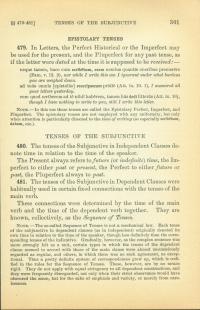479. In letters, the Historical Perfect or the imperfect may be used for the present tense, and the pluperfect for any past tense, as if the letter were dated at the time it is supposed to be received.
Neque tamen, haec cum scrībēbam, eramnescius quantīs oneribus premerēre. (Fam. 5.12.2)
Nor while I write this am I ignorant under what burdens you are weighed down.
Ad tuās omnīs [epistulās] rescrīpseram prīdiē. (Att. 9.10.1)
I answered all your letters yesterday.
Cum quod scrīberem ad tē nihil habērem, tamen hās dedī litterās. (Att. 9.16)
though I have nothing to write to you, still I write this letter.
Note— In this use these tenses are called the Epistolary Perfect, Imperfect,and Pluperfect. The epistolary tenses are not employed with any uniformity, but only when attention is particularly directed to the time of writing (so especially scrībēbam, dabam, etc.).

